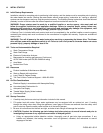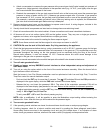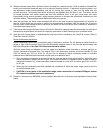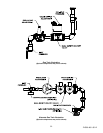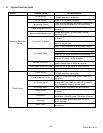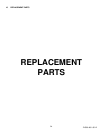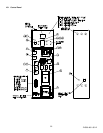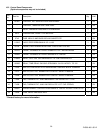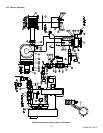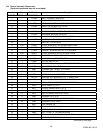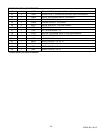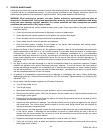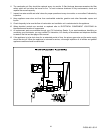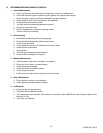40
PV500-46U 06/12
17 PERIODIC MAINTENANCE
Listed below are items that must be checked to ensure safe reliable operations. Maintenance must be performed by
a qualified service or maintenance provider. To ensure proper maintenance, the following instructions should be
posted near the appliance and maintained in legible condition. Verify proper operation after servicing.
WARNING: When servicing the controls, use exact, Factory authorized, replacement parts and label all
wires prior to disconnection. Verify proper operation after servicing. Incorrect parts substitution and wiring
errors can cause damage, improper operation, fire, carbon monoxide and other unexpected and unsafe
conditions that could result in fire, injury or death.
1. Examine the appliance and venting system at least once a year. Check more often in first year to determine
inspection interval.
a. Check all joints and pipe connections for tightness, corrosion or deterioration.
b. Check the electronic-ignition system for quick ignition and a proper flame signal.
c. Check all safety controls including thermostats for proper operation.
d. Check safety shut-off valves for operation and tightness.
e. Have the entire system, including, but not limited to, the burner, heat exchanger and venting system,
periodically inspected by a qualified service agency.
2. Exposure to Dusty or Dirty Combustion Air: An appliance installed in a dust or dirt contaminated atmosphere will
require replacement of the filter on a 3 to 6 month schedule or more often, based on severity of contamination.
Contaminants can be drawn in with the combustion air. Inadequate combustion air or non-combustible
particulate matter such as dust, dirt, dryer lint, concrete dust, dry wall dust or the like can block burner ports and
cause unsafe operation and a non-warrantable failure. Do not remove filter without a suitable replacement. To
inspect and clean the burner, a qualified serviceman or installer should use the procedures described in item 5
& 6 below.
3. Any sign of soot on the heat exchanger or in the flue indicates the need for a combustion inspection. Properly
installed and adjusted units seldom need heat exchanger cleaning. If soot has formed, the most common
causes are restricted combustion air or excessive gas. A blocked heat exchanger can cause unsafe operation
and will reduce efficiency. To inspect and clean the heat exchanger, a qualified service agent or installer should
use the procedures described in item 5 & 6 below.
4. All gaskets on disassembled components must be replaced on reassembly with exact, Factory Authorized,
replacement parts only. Gasket kits are available from your PVI Industries
®
Representative or by contacting PVI
Industries
®
, LLC.
5. Burner and/or Heat Exchanger Inspection and Cleaning Procedure:
a. Turn off main power to unit.
b. Turn off gas supply.
c. Write notes and/or take pictures during this process to aid in correct reassembly.
d. Remove the hot surface igniter, (HSI) from the burner. Be very careful not to bump the igniter element due
to the fragility of the igniter.
e. Remove the nuts that secure the burner top plate to the burner flange and lift the burner top plate up until it
is completely extracted from the burner.
f. Inspect top plate refractory for damage. The refractory should provide a tight seal against the top edge of
the burner deck. The silicone foam gasket located on the top plate flange should also be checked for
damage or excessive compression set.
g. With the burner top plate removed, inspect the deck surface of the burner for lent or other blockage carried
in the fuel air stream. If blockage has accumulated, use brush to loosen debris and use a vacuum to
remove from the burner cavities. Do not brush or scrub the metal fiber burner surface as this can cause
permanent damage to the burner material.
h. Replace any damaged components and reassemble in reverse order. (4-5 ft/lbs).
i. Cycle unit and test to verify all safety and operating controls are properly functioning and the burner top
plate flange is free of leaks.



